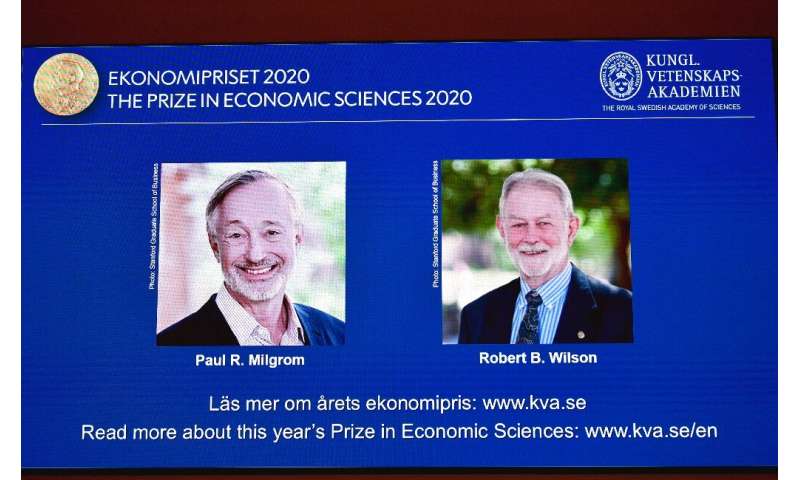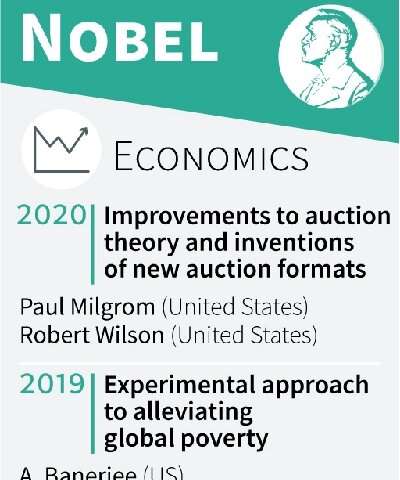by Johannes Ledel, With Marc Preel

Paul Milgrom and Robert Wilson have helped invent new auction formats
US economists Paul Milgrom and Robert Wilson won the Nobel Economics Prize on Monday for work on commercial auctions, including for goods and services difficult to sell in traditional ways such as radio frequencies, the Nobel Committee said.
The duo was honoured "for improvements to auction theory and inventions of new auction formats," the jury said.
The Royal Swedish Academy of Sciences noted that the discoveries by Milgrom, 72, and Wilson, 83, "have benefitted sellers, buyers and taxpayers around the world," it said in a statement.
Wilson, a professor at Stanford in the US, was spotlighted for developing a theory for auctions with a common value, "a value which is uncertain beforehand but, in the end, is the same for everyone," according to the academy.
Wilson's work showed why rational bidders tend to bid under their own estimate of the worth due to worries over the "winner's curse," or winning the auction but paying too much.
Milgrom, also at Stanford, then came up with a more general theory of auctions, by analysing bidding strategies in different auction forms.
The academy noted that while "people have always sold things to the highest bidder," societies have also had to allocate "ever more complex objects... such as landing slots and radio frequencies."
"In response, Milgrom and Wilson invented new formats for auctioning off many interrelated objects simultaneously, on behalf of a seller motivated by broad societal benefit rather than maximal revenue," the academy said.
The winners will share the prize sum of 10 million Swedish kronor (about $1.1 million, 950,000 euros).
Speaking to reporters in Stockholm via a telephone link, Wilson said the announcement had been "very happy news," conceding that despite his research focus he himself had "never participated in an auction."
 The winners of the Nobel prize for economics, 2016-2020
The winners of the Nobel prize for economics, 2016-2020
However, he quickly had to retract his statement. "My wife is pointing out that we bought ski boots on eBay, I guess that was an auction," Wilson said.
Last year the honour went to French-American Esther Duflo, Indian-born Abhijit Banerjee of the US, and American Michael Kremer for their experimental work on alleviating poverty.
Not created by Alfred Nobel
Even if it might be the most prestigious prize an economist can hope to receive, the economics prize has not reached the same status as the awards originally chosen by Alfred Nobel in his 1895 will founding the awards, which included medicine, physics, chemistry, literature and peace.
It was instead created in 1968 through a donation from the Swedish central bank and detractors have thus dubbed it "a false Nobel."
The award closes the 2020 Nobel season, which saw the closely-watched peace prize awarded to the UN's World Food Programme.
Women have been more prevalent than usual this year, with American poet Louise Gluck winning the literature prize.
Frenchwoman Emmanuelle Charpentier and American Jennifer Doudna became the first all-female duo to win a scientific Nobel on Wednesday, clinching the chemistry award for their discovery of the CRISPR-Cas9 DNA snipping "scissors".
While the number of female winners has risen sharply since the turn of the century, they still represent only about one out of every 20 Nobel medals since 1901.
Winners would normally receive their Nobel from King Carl XVI Gustaf at a formal ceremony in Stockholm on December 10, but the pandemic means it has been replaced by a televised ceremony showing the laureates receiving their awards in their home countries.
Explore furtherNobel awards season comes to an end with economics prize
US economists Paul Milgrom and Robert Wilson won the Nobel Economics Prize on Monday for work on commercial auctions, including for goods and services difficult to sell in traditional ways such as radio frequencies, the Nobel Committee said.
The duo was honoured "for improvements to auction theory and inventions of new auction formats," the jury said.
The Royal Swedish Academy of Sciences noted that the discoveries by Milgrom, 72, and Wilson, 83, "have benefitted sellers, buyers and taxpayers around the world," it said in a statement.
Wilson, a professor at Stanford in the US, was spotlighted for developing a theory for auctions with a common value, "a value which is uncertain beforehand but, in the end, is the same for everyone," according to the academy.
Wilson's work showed why rational bidders tend to bid under their own estimate of the worth due to worries over the "winner's curse," or winning the auction but paying too much.
Milgrom, also at Stanford, then came up with a more general theory of auctions, by analysing bidding strategies in different auction forms.
The academy noted that while "people have always sold things to the highest bidder," societies have also had to allocate "ever more complex objects... such as landing slots and radio frequencies."
"In response, Milgrom and Wilson invented new formats for auctioning off many interrelated objects simultaneously, on behalf of a seller motivated by broad societal benefit rather than maximal revenue," the academy said.
The winners will share the prize sum of 10 million Swedish kronor (about $1.1 million, 950,000 euros).
Speaking to reporters in Stockholm via a telephone link, Wilson said the announcement had been "very happy news," conceding that despite his research focus he himself had "never participated in an auction."
 The winners of the Nobel prize for economics, 2016-2020
The winners of the Nobel prize for economics, 2016-2020However, he quickly had to retract his statement. "My wife is pointing out that we bought ski boots on eBay, I guess that was an auction," Wilson said.
Last year the honour went to French-American Esther Duflo, Indian-born Abhijit Banerjee of the US, and American Michael Kremer for their experimental work on alleviating poverty.
Not created by Alfred Nobel
Even if it might be the most prestigious prize an economist can hope to receive, the economics prize has not reached the same status as the awards originally chosen by Alfred Nobel in his 1895 will founding the awards, which included medicine, physics, chemistry, literature and peace.
It was instead created in 1968 through a donation from the Swedish central bank and detractors have thus dubbed it "a false Nobel."
The award closes the 2020 Nobel season, which saw the closely-watched peace prize awarded to the UN's World Food Programme.
Women have been more prevalent than usual this year, with American poet Louise Gluck winning the literature prize.
Frenchwoman Emmanuelle Charpentier and American Jennifer Doudna became the first all-female duo to win a scientific Nobel on Wednesday, clinching the chemistry award for their discovery of the CRISPR-Cas9 DNA snipping "scissors".
While the number of female winners has risen sharply since the turn of the century, they still represent only about one out of every 20 Nobel medals since 1901.
Winners would normally receive their Nobel from King Carl XVI Gustaf at a formal ceremony in Stockholm on December 10, but the pandemic means it has been replaced by a televised ceremony showing the laureates receiving their awards in their home countries.
Explore furtherNobel awards season comes to an end with economics prize
No comments:
Post a Comment